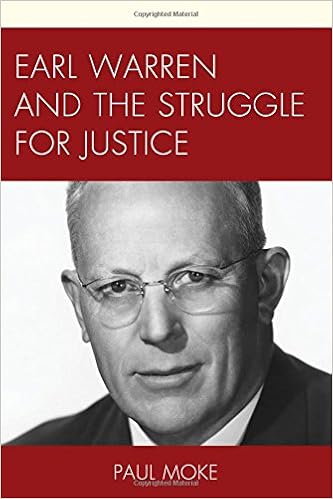Today marks 125 years since the birth of Earl Warren, the 14th Chief Justice of the US Supreme Court, in Los Angeles, California. Warren’s tenure on the Court was from 1953 when President Dwight D. Eisenhower nominated him until his retirement in 1969. Earl Warren had enormous impact on the political and legal landscape of twentieth century America. In his long public service, Warren pursued a Progressive vision of ethical and effective government that brought moral integrity to the nation’s public policies, especially in the fields of racial relations, criminal justice, and freedom of marital association. Warren’s path-breaking approach to legal writing and his management of the responsibilities of the Office of Chief Justice encouraged public understanding of and support for the work of the Supreme Court.
A graduate of the University of California at Berkeley, he was elected district attorney of Alameda County in 1925 and continued to be reelected through 1938, when he was elected Attorney General of California. In 1942, Warren ran successfully for Governor of California as a Republican and was reelected in 1946 and 1950. He ran for Vice President of the United States in 1948 on the Republican ticket with Thomas Dewey, who lost to Harry Truman, the Democratic incumbent.
The Warren Court issued a host of notable decisions including decisions holding segregation policies in public schools (Brown v. Board of Education) and anti-miscegenation laws unconstitutional (Loving v. Virginia); ruling that the Constitution protects a general right to privacy (Griswold v. Connecticut); that states are bound by the decisions of the Supreme Court and cannot ignore them (Cooper v. Aaron); that public schools cannot have official prayer (Engel v. Vitale) or mandatory Bible readings (Abington School District v. Schempp); the scope of the doctrine of incorporation in state criminal matters (Mapp v. Ohio, Miranda v. Arizona) was dramatically increased; reading an equal protection clause into the Fifth Amendment (Bolling v. Sharpe); holding that the states may not apportion a chamber of their legislatures in the manner in which the United States Senate is apportioned (Reynolds v. Sims); and holding that the Constitution requires the states to provide defense attorneys to criminal defendants charged with serious offenses (Gideon v. Wainwright).
Warren was Chair of the Warren Commission on the Assassination of President Kennedy. Serious lapses in judgment and uncritical deference to authority regarding national security issues in the report have clouded his legacy. The Brooklyn Law School Library has in its collection Earl Warren and the Struggle for Justice by Paul Moke (Call # KF8745.W3 M65 2015), a highly readable biography that offers an updated and balanced appraisal of Warren’s leading social justice decisions and a liberal critique of his failings that provides new insights into Warren, the man, the jurist, and the leader.
Chair of the Warren Commission on the Assassination of President Kennedy. Serious lapses in judgment and uncritical deference to authority regarding national security issues in the report have clouded his legacy. The Brooklyn Law School Library has in its collection Earl Warren and the Struggle for Justice by Paul Moke (Call # KF8745.W3 M65 2015), a highly readable biography that offers an updated and balanced appraisal of Warren’s leading social justice decisions and a liberal critique of his failings that provides new insights into Warren, the man, the jurist, and the leader.
